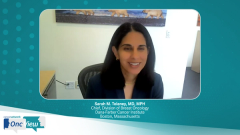
Exciting Developments in the HER2+ Breast Cancer Treatment Landscape
Sarah M. Tolaney, MD, MPH, highlights recent and investigative treatments for HER2+ breast cancer that excite her and provides some clinical pearls for community oncologists.
Episodes in this series

Sarah M. Tolaney, MD, MPH: We’ve seen many new agents get approval in the last 2 years, which has dramatically changed outcomes for our metastatic, HER2 [human epidermal growth factor receptor 2]–positive patients. We’ve seen approval for trastuzumab deruxtecan [Enhertu] based on data from DESTINY-Breast01, which had shown unprecedented activity and pretreated HER2+ disease with a 60% response and an almost a 20-month progression-free survival [PFS]. We’ve seen data from DESTINY-Breast03 [DBO3] suggesting a PFS that wasn’t reached by central review but was it about 25 months with T-DXd [trastuzumab deruxtecan] compared with a little over 6 months with TDM-1 [trastuzumab emtansine]. It had a hazard ratio rate of 0.28, which is something I’ve never seen before in a registration study. T-DXd [trastuzumab deruxtecan] seems very different from any agent we’ve had for HER2+ cancers, and it’s changing the paradigm of our treatment approaches. In my mind, it should be a second-line standard after THP [docetaxel, trastuzumab, pertuzumab] based on data from DBO3.
We also have unique data from HER2CLIMB, suggesting that if you had tucatinib [TUKYSA] to capecitabine [Xeloda] and trastuzumab [Herceptin], you improve not only PFS but also OS [overall survival]. This is true even in patients with active brain metastases, where there was a 9-month improvement in overall survival from adding tucatinib to capecitabine and trastuzumab in patients with active brain metastases. This was the first registration-randomized trial to show a survival benefit from therapy and patients with HER2+ brain metastases. It’s a totally new finding, which thankfully is changing outcomes for our patients with brain metastases.
We touched on some data looking at margetuximab [Margenza], a new agent, and a novel monoclonal antibody that seems to perform better than trastuzumab in metastatic HER2+ disease. We also have approval for neratinib [Nerlynx] in combination with capecitabine and pretreated HER2+ breast cancer. There are so many treatment options, but it does bring up questions about optimal ways to sequence all these drugs. It needs to be done on an individual level, factoring in whether someone has brain metastases when you’re making these treatment decisions. Certainly, we’re also thinking about performance status ability to comply with oral therapies or get into an infusion. A lot of other things have to be factored in with these decisions, but there are so many options, all highly effective treatment approaches.
For early stage patients, it’s critical to use preoperative therapy as much as you can because it’s critical to understand the response to therapy. That allows you to adapt your adjuvant approach, which can change treatment outcomes. This is critical, particularly in stage II and III patients. But we’ve made such headway in improving outcomes for HER2+ patients by introducing more very potent HER2-directed therapies, such as adding pertuzumab [Perjeta] to trastuzumab and using TDM-1 [trastuzumab emtansine] in the residual disease setting. We’re improving efficacy, but we’re still using quite a bit of chemotherapy. It raises the question of how we can de-escalate therapy further for these patients. Thinking about clinical trial options for your early stage patients is really important to help tailor therapy and individualize a treatment approach. It will help us do better in the long run, where we can hopefully maintain the outstanding efficacy that we achieve but also reduce toxicity in our patients.
Transcript edited for clarity.
Newsletter
Stay up to date on recent advances in the multidisciplinary approach to cancer.






































